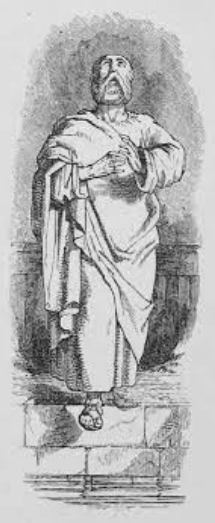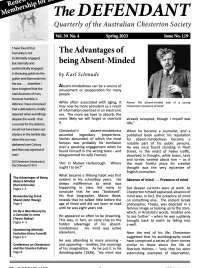Absent-mindedness can be a source of amusement or exasperation for many
people.

While often associated with aging, it may now be more prevalent as a result of information overload in an electronic era. The more we have to absorb, the more likely we will forget or overlook it.
Chesterton’s absent-mindedness assumed legendary proportions. Stories abounded, of which the most famous was probably his confusion over a speaking engagement when he found himself in the wrong town – and telegrammed his wife Frances:
“Am in Market Harborough. Where ought I to be?”
What became a lifelong habit was first evident in his schoolboy years. His sleepy indifference to what was happening in class led many to conclude that he was “backward”. His first biographer, Maisie Ward, reveals that he talked little before the age of three and did not learn to read until he was eight years old.
He appeared so often to be dreaming. This was, in fact, an early clue to the hidden advantage of his absent-mindedness. His mind was active elsewhere.
He was attending to more pressing – and appealing – realities, the roamings of his imagination. As he put it in his Autobiography (1936), “my mind was already occupied, though I myself was idle.”
When he became a journalist, and a published book author, his reputation for absent-mindedness became a notable part of his public persona. He was once found standing in Fleet Street, in the midst of heavy traffic, absorbed in thought, while buses, taxis and lorries swirled about him – as if the most fruitful place for creative thought was the very epicentre of English journalism.
Absence of mind . . . Presence of mind
But deeper currents were at work. As Chesterton himself explained, absence of mind was, in fact, the presence of mind on something else. The ancient Greek philosopher, Thales, was depicted in a famous image as looking up to the stars, which, in Aristotle’s words, ‘enables one to see further’ – when he was suddenly brought back to earth by falling into a well.
Near the end of his life, Chesterton suggested that his autobiography could have comprised a series of short stories similar to those about the life of Sherlock Holmes – “only that his were astonishing examples of observation, and mine astonishing examples of lack of observation . . . concerned with my absence of mind, instead of his presence of mind.”

When Chesterton created his detective character of Father Brown, he invested him with a certain clumsiness and absent-mindedness. This has a dual effect in the Father Brown stories. It tends to lead the other characters in the story to underrate the priest’s detecting ability, and it can give the criminal a false sense of security – that his responsibility for a crime has escaped notice.
Father Brown’s “absence of mind” also fits in with his approach as a detective – that he finds the criminal by getting inside his character, and imagining how he felt when he committed the crime.
In “The Secret of Father Brown”, a visiting American, Grandison Chace, suggests to Father Brown that his effectiveness is related to a difference of method from the normal detective – that, in fact, it reflects an absence of method. The priest is puzzled. He says to Mr Chace: “I beg your pardon. Yes . . . Absence of method. . . . Absence of mind, too, I’m afraid.”
By “absence of mind”, Father Brown meant that he was less interested in the external details of the crime – focusing on the “outside” of the criminal, as it were, all of the overt clues. This allowed him to bestow a “presence of mind” on the “inside” of the suspected criminal.
“I don’t try to get outside the man,” he tells Grandison Chace. “I try to get inside the murderer.”
By such concentration on the human character behind the crime, Father Brown could come to understand “in what style or state of mind a man could really do it”. When the priest had come to feel exactly like the murderer himself, he was able to identify who the criminal was.
Absent-minded professor
The absent-minded detective bears some similarities to the absent-minded professor, an archetype of the academic life.
Such a character has long showed a preoccupation with his higher interests and studies. He combined a neglect of practical details – such as whether his socks or shoes matched, or he had gravy stains on his tie, or he remembered to complete a requested form according to deadline – with an absorption in his academic subject.
The archetype is largely absent from the modern corporatized university. It hardly fits with a culture of managerial conformity and humourlessness.
The absent-minded professor was a stock character in literature. He featured in detective fiction, – for example, Agatha Christie’s “Man in the Brown Suit”, where the father of the main character, Anne Beddingfeld, is a famous archaeologist known for forgetting meals and being confused about money.
The character also featured in movies – such as The Absent-Minded Professor (1961) and the British satire of university life, Lucky Jim (1957), which contained not one but two absent-minded professors, one of whom repeatedly muddled the main character’s surname.
But perhaps these signs of confusion on the part of the absent-minded reflect an ultimate advantage. As in Chesterton’s case, “absence of mind” can grant a certain aloofness from the trivial and the temporal that swamp our attention, day after day.
It can offer a detachment from the immediate and the current. It thereby opens up a new “presence of mind”, allowing us to penetrate the permanent realities, and ponder the deeper truths, that we can easily tend to avoid or overlook.
